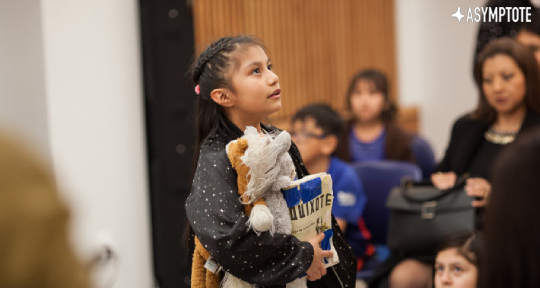One of the most devastating outcomes of the COVID-19 pandemic was the damage it inflicted on the education of children worldwide. As schools shut their doors and valued programs reluctantly halted, both kids and their educators were cut off from their communities and, for some, their places of refuge. In the following essay, assistant blog editor Edwin Alanís-García shares his experience working with one of these programs and spaces in New York City, a literary haven fittingly called Still Waters in a Storm.
The Traveling Serialized Adventures of Kid Quixote is a modern-day musical reimagining of Miguel de Cervantes’ Don Quixote, of which the translators and performers are a community of young writers and thinkers ranging in age from seven to sixteen. To call this project “ambitious” would be an understatement—Traveling Adventures is a thorough reinterpretation of a four-hundred-year-old masterpiece of Hispanophone literature, being adapted into songs, theater performances, and even metafictional meditations on social justice, immigration, and the process of translation itself. It is a translation project years in the making, and the children were finally ready to present the first installments to the world.
Their visit to my alma mater was a confluence of the two literary worlds I’d known in New York City: the MFA program at New York University, and the sanctuary of Still Waters in a Storm, an after-school program in the working-class neighborhood of Bushwick, Brooklyn. I volunteered at Still Waters during my last year of study, and was lucky to have witnessed the genesis of Traveling Adventures.
On a Friday morning in February, 2018, I took a train from Cambridge, MA to Boston’s South Station. The five-hour bus ride from Boston to New York stopped just a few blocks shy of the Lillian Vernon Creative Writers’ House in Manhattan’s Greenwich Village, a literary landmark in a city of literature, and a space that has welcomed many of the world’s greatest poets and writers. It was a fitting venue for the Kid Quixotes. Though the performance space was smaller than some of the college classrooms and theater stages they’d been using on the tour, that intimacy provided a near theater-in-the-round experience. As one young performer described it, it felt more like doing a show in someone’s living room.
Friends and teachers spilled into the parlor. We sat close to the “stage,” a blocked-in area designated by the performers. At this distance, we weren’t just spectators, we were participants in a tale that began in seventeenth-century Spain and continued into twenty-first-century New York. The frame story begins with our protagonist (played by eight-year-old actor and author Sarah Sierra) being called to bed by her mother. Young Sarah wants to stay awake and read Don Quixote—she wants to become Don Quixote. In doing so, she adopts the persona of Kid Quixote, protector of the abused and oppressed. The dialogue is in Spanish, but quickly becomes bilingual when the scenes from the novel come to life. As she walks to school, Kid Quixote jumps into a scene from Chapter IV; a farmer is whipping a boy, and she cannot abide this injustice. What would be a horrifying scene of violence is reimagined by the children into an act of resistance, and the cruel farmer is made to look like a fool. Kid Quixote’s mission to help the downtrodden is set to “The Rescuing Song,” a plea and a promise to help those in need of protection. It is a song about belonging, and ultimately about “home.”




